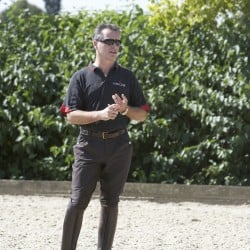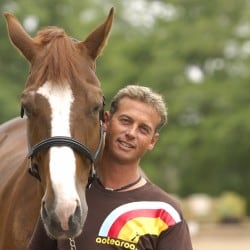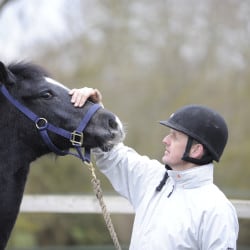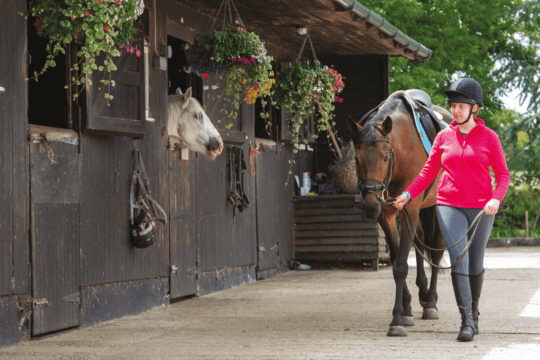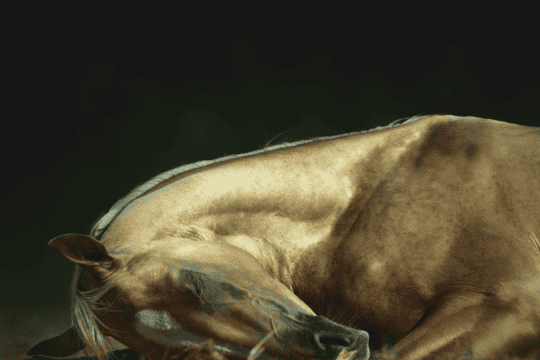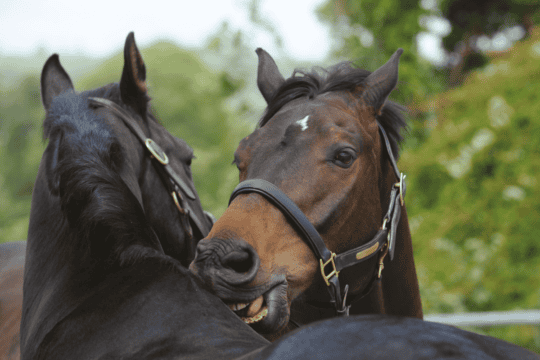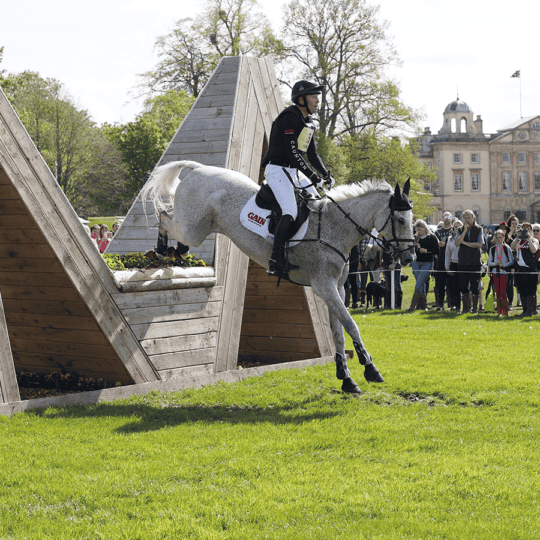Featured Professional

Anna Haines
Anna is a qualified Equine Behaviour Consultant based in Cheshire, who has been around horses for most of her life, having started riding at the age of five. She is a regular contributor to Horse&Rider and is a member of our 'Ask the Expert' team.
When it’s time to call it a day on your horse’s working career, you may find yourself unsure about what comes next. Equine Behaviourist Anna Haines shares advice to give him a healthy, happy retirement
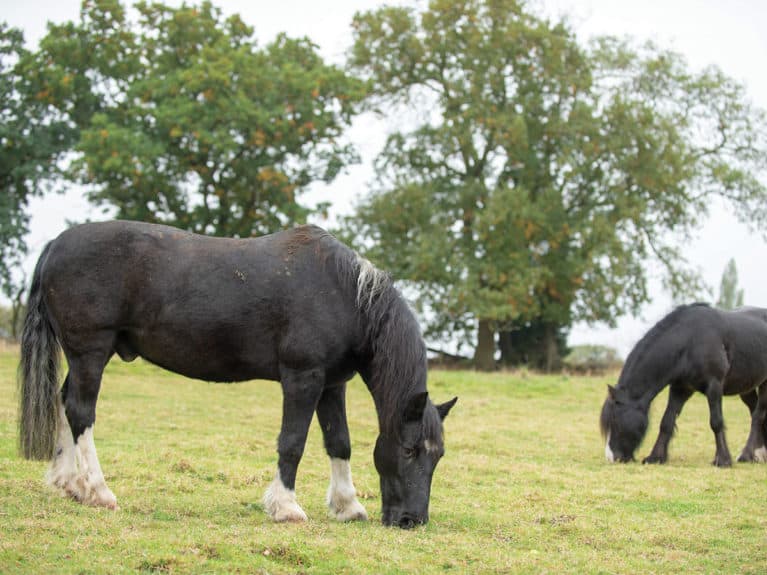
Whether you’ve known your horse from birth, backing and beyond, or joined him later on in the course of his life, it’s important to give your golden oldie the very best of care when it’s time for him to enjoy a slower pace of life. A comfortable retirement is a reward for his hard work and continued companionship over the years, but first, get clued up on what’s best for him.
Despite his increasing needs, keeping your older horse happy and content needn’t be a challenge. If you take into account the things you can do to make his retirement the most enjoyable, you’ll continue to see your horse thrive through his later years.
Did you know?
If your horse’s eyesight or hearing becomes impaired, you may find that the bond he has with his companion becomes even stronger as he begins to rely more on his friend for information about his environment.
Retirement village
Companionship is key for your older horse and, while he may not always feel up to running with the herd, it’s important that you fight the temptation to separate him off into a paddock on his own out of the way. His need for equine companionship is as strong as ever, so if he lives in a calm and settled herd, he’ll be happiest staying there – elderly horses can have a positive effect on younger horses, helping to educate the fledglings of the field.
If he remains in a herd with younger horses, make sure he’s still able to access the resources he needs. Sometimes a younger companion might push an elderly horse away from piles of hay or stop him accessing fresh drinking water, so watch out for this kind of behaviour.
Top tip
If your horse lives in a herd of energetic horses who enjoy a good game of rough and tumble, he may require separating. Try to move him with a friend so he can still benefit from companionship without the risks of injury or discomfort from too much exuberant play.
Incident-free introductions
Ideally, your older horse should be kept in a field with as few disruptions as possible, but if new horses need to be introduced, special care should be taken to avoid any injuries through aggressive interaction.
To minimise the chance of this happening, allow the new arrivals to spend as long as possible in an adjoining field so they can first get to know each other across a safe barrier.
When the time comes to introduce them directly, allow your horse and his closest companion to meet the new arrivals without the rest of the herd to aid a smoother transition.
Top tip
Before introducing new horses into an established group, carry out some scent swapping by placing droppings from the new horses with the existing herd and vice versa. Horses pick up a great deal of information about each other from sniffing droppings, which can help to minimise problems when they find themselves face-to-face.
Location, location, location
Consider the ground type, size and gradient of the turnout area your horse is living in. Bear in mind that he may be less able to cover the distances he could when he was younger so, if he’s kept in a large field, you may need to restrict him to a smaller paddock so he can still easily move between resources.
Muddy conditions may become difficult for him to cope with, too, especially when temperatures drop and the mud freezes. This type of hard, pitted ground increases the risk of injury so, if possible, make alternative arrangements so he can avoid areas such as these.
If his field is on a steep gradient, this too may pose some difficulties for him and it may be necessary to move him to a gentler slope or flat field.
Top tip
Time in the sun without a rug on will allow sunlight to reach your horse’s skin, generating vitamin D. This is especially important for older horses because a deficiency of vitamin D can lead to reduced bone strength.
Keep him cosy
Horses become less able to cope with extremes as they venture into their later years and this is particularly true of the weather. As he ages, your horse’s ability to control his body temperature reduces. He’s likely to carry less body fat than when he was younger and he’s probably less mobile than he once was, which means he may require rugging differently.
Because older horses may also have reduced digestive efficiency due to health problems, this too could mean that he feels the cold more easily as his digestive processes provide him with his own internal central heating. Having constant access to quality forage is essential to help maintain his body condition and will also help to keep him warm in cold weather.
The chill factor
How much a horse feels the cold is down to the individual. Be careful not to fall into the trap of putting a thick rug on and continuing to use it throughout the winter, day and night, simply because your horse is growing older. Instead, ensure you know him well and rug appropriately for the weather bearing in mind that windy and rainy conditions will make temperatures feel colder.
The whole tooth
Missing teeth and other dental problems are common in elderly horses and, at best, make grazing and chewing forage difficult. At worst, it can lead to pain, reluctance to eat and, subsequently, weight loss. This, is just one reason why it’s important for your horse to have regular vet checks – identifying problems early can prevent any further issues from arising.
Consider what your horse is able to eat as he gets older, especially if he has missing teeth. A high-fibre diet is essential, but he may have difficulties chewing enough hay or haylage, so softer or soaked feed may be required instead. There’s a variety of forage-based feeds on the market that’ll provide him with the nutrients he needs to stay healthy when fed at the recommended rate.
Some horses find it difficult to eat shorter grass due to wear and tear on their teeth, so your horse may also benefit from grazing on quality grass of a longer length so it’s easier for him to eat.
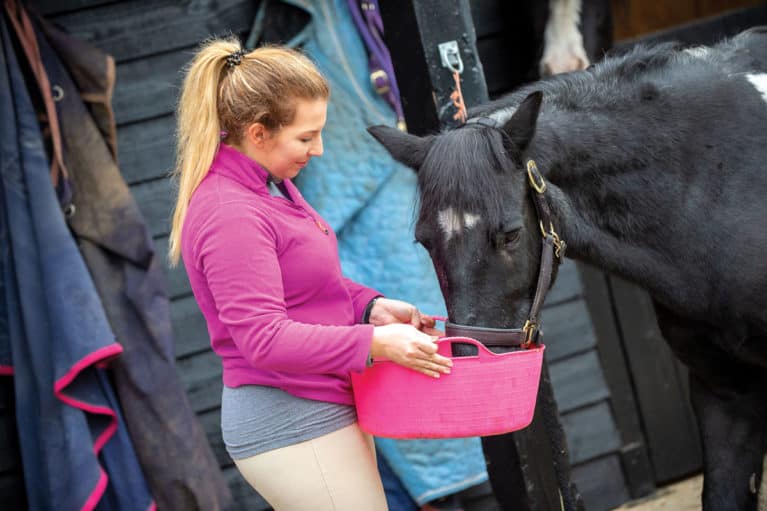
Top tip
If your horse requires a greater amount of softened food in a bucket, he may also need a safe place to eat this away from other horses. Each horse is an individual, but it may be best for him to come in or be separated from the herd briefly.
Keep an eye out
Cataracts are a common eye problem in older horses, causing their sight to diminish over time. Vision is one of your horse’s primary senses, so to lose it or for it to deteriorate can cause him to feel vulnerable to potential dangers. It may also make him reluctant to move around in his environment and more anxious than he was before.
Keeping his environment the same can help him to feel safer in his surroundings – hay, water and feed should be put in the same place every day to avoid confusion. Handling of horses with impaired vision should be calm, careful and considered, using your voice to let them know where you are and using gentle touch as you move around their body so that you don’t startle them.
Carry on moving
Although you may feel that you want to keep your horse wrapped up cosy in his warm bed as the cold nights creep in, remember that a horse’s needs are different to that of a human and actually 24/7 turn out can have huge benefits.
The ideal set-up for your elderly horse would offer free access to a barn or stable, with a thick bed for him to lie down on if he chooses to. Depending on his physical health, he’ll likely benefit from continuing to do some light exercise, too – this’ll also keep him mentally stimulated. You can take him out on foot, lead him from another horse or, if he’s comfortable with you doing so, you could take to the saddle for a light hack. Try to take him out at the same time as a companion so he feels safe and confident.
Top tip
Keep an eye on your horse for any abnormal movement that might suggest pain. Joint pain may prevent him from lying down and getting up easily, which can negatively impact his sleep because horses need to lie down to have REM (rapid eye movement) sleep. A lack of sleep and a disrupted sleep pattern may even cause behavioural problems.
Quality, not quantity
Monitoring the health and condition of your older horse is essential to keep him comfortable. Recording his weight monthly using a body condition score chart will help you manage his weight, recognise any loss of condition and quickly address problems that arise. Regular check-ups from the vet are also important to help you to identify whether your horse is experiencing any discomfort and will assist you in monitoring his quality of life.
Knowing when to make the decision to say a final goodbye to your elderly equine companion can be difficult. Monitoring quality of life indicators can help to ease this process and allow you to identify whether he’s maintaining the same living standards he’s been accustomed to throughout his life. These include…
• eating and drinking Is he still able to take in sufficient food and water?
• movement Is he as active as usual, or is he stiff, reluctant or struggling to move?
• social interactions Does he keep his distance from the herd? Is he interacting with you as normal?
• body condition score Is he losing weight, or struggling to maintain weight and overall condition?
• general demeanour Does he seem to be enjoying life still, or is he withdrawn, dull or depressed?
So much to give
Our horses give us so much joy throughout their lives, and it doesn’t stop just because they can no longer be ridden. As your horse continues to provide you with companionship, you owe it to him to offer a happy, comfortable and consistent retirement by meeting his needs as they develop with his advancing age.

